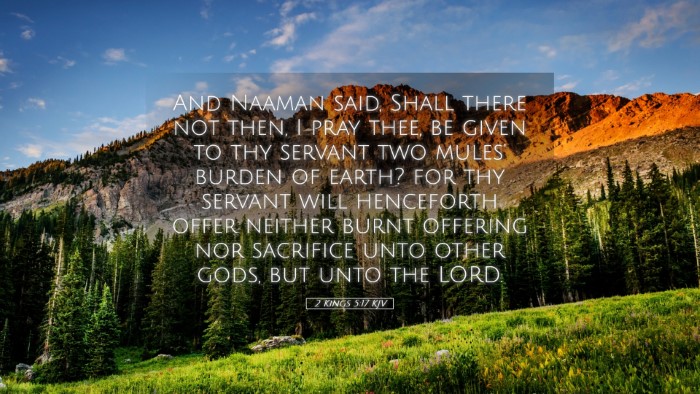Commentary on 2 Kings 5:17
Bible Verse: "So Naaman said, 'Then, if not, please let your servant be given two mule loads of earth, for your servant will no longer offer either burnt offering or sacrifice to other gods, but to the Lord.'" (2 Kings 5:17, NKJV)
Introduction
This verse is a significant moment in the narrative of Naaman, a Syrian commander who encounters the Prophet Elisha and is healed of leprosy. His request to take soil from Israel symbolizes a profound shift in his spiritual allegiance and commitment to the God of Israel. The insights from public domain commentaries shed light on the theological and practical implications of Naaman's declaration.
Insights from Matthew Henry
Matthew Henry emphasizes the transformational aspect of Naaman's healing and the consequent change of heart. He depicts Naaman's desire to take earth from Israel as a recognition of God’s unique authority. In the ancient Near East, the land was associated with its deity; thus, Naaman’s request reflects his understanding that the Lord, being the God of Israel, must be worshipped on Israelite soil.
Henry elaborates that this act signals Naaman’s commitment to renounce his former idolatrous practices, as he states he will no longer offer sacrifices to foreign gods. This acknowledgment of the God of Israel’s supremacy showcases not only personal faith but also an understanding that true worship requires an appropriate context—which, in this case, is the land of Israel.
Reflections from Albert Barnes
Albert Barnes interprets Naaman’s request as an expression of his newfound devotion. He suggests that Naaman's act of taking soil symbolizes a practical manifestation of his faith, illustrating that genuine belief often leads to physical actions that demonstrate commitment. Naaman's desire to be equipped for worship indicates that he seeks to internalize and establish his devotion to the Lord.
Furthermore, Barnes raises an important question about the nature of Naaman's worship now that he has chosen to serve the Lord alone. He points out the delicate balance Naaman must strike in his new role as the commander in a nation that worships other gods. The narrative illustrates the challenges faced by believers in maintaining fidelity to God amidst the pressures of a pluralistic society.
Insights from Adam Clarke
Adam Clarke provides a rich commentary on the cultural implications of Naaman's request. He discusses the significance of the earth being brought back to Aram (Syria), positing that this was intended to create a physical space for worship dedicated to Yahweh. Clarke notes that it is crucial for the worship of Yahweh to be both personal and contextual, allowing Naaman to honor God in a way that fits his understanding and environment.
Moreover, Clarke points out that Naaman recognizes the limitations of his previous religious practices and the necessity of establishing an exclusive relationship with the God of Israel. His intentions to offer sacrifices only to the Lord further reflect a desire to break from idolatry; he not only seeks healing but also a lasting covenant with the God who healed him.
Theological Themes
- The Nature of True Worship: Naaman's actions illustrate that true worship goes beyond mere tradition; it requires a heartfelt commitment to the one true God. His desire to bring soil returns to the importance of physical and communal contexts in the practice of faith.
- Divine Authority and Sovereignty: Naaman’s recognition of the Lord as the sole deity mirrors the larger biblical narrative of divine sovereignty over all nations. It emphasizes that God's power transcends geographical boundaries.
- Transition from Idolatry to Monotheism: The shift in Naaman's worship reflects the transformative power of God’s work in an individual’s life, leading to a rejection of prior beliefs in favor of loyalty to the Lord.
Practical Applications for Believers
- Understanding Contextual Worship: Believers today are encouraged to contemplate how their environment shapes their worship and relationship with God, emphasizing the need for authenticity and context in expressing faith.
- Commitment Over Tradition: Naaman's choice signifies the importance of personal commitment to God over longstanding traditions that fail to recognize His sovereignty. Modern believers are challenged to evaluate their own practices and make changes as needed.
- The Call to Witness: Naaman's transformation serves as an example for Christians to be witnesses of God's work in their lives, emboldening them to share their faith with others, regardless of cultural constraints.
Conclusion
2 Kings 5:17 serves as a pivotal moment in the story of Naaman, illustrating the profound impact of divine encounter and healing. The insights gleaned from public domain commentaries enlighten readers on the intricate layers of worship, authority, and personal commitment. For pastors, students, theologians, and scholars, this verse challenges us to reflect on the nature of our worship and our allegiance to God in a world filled with competing beliefs.


